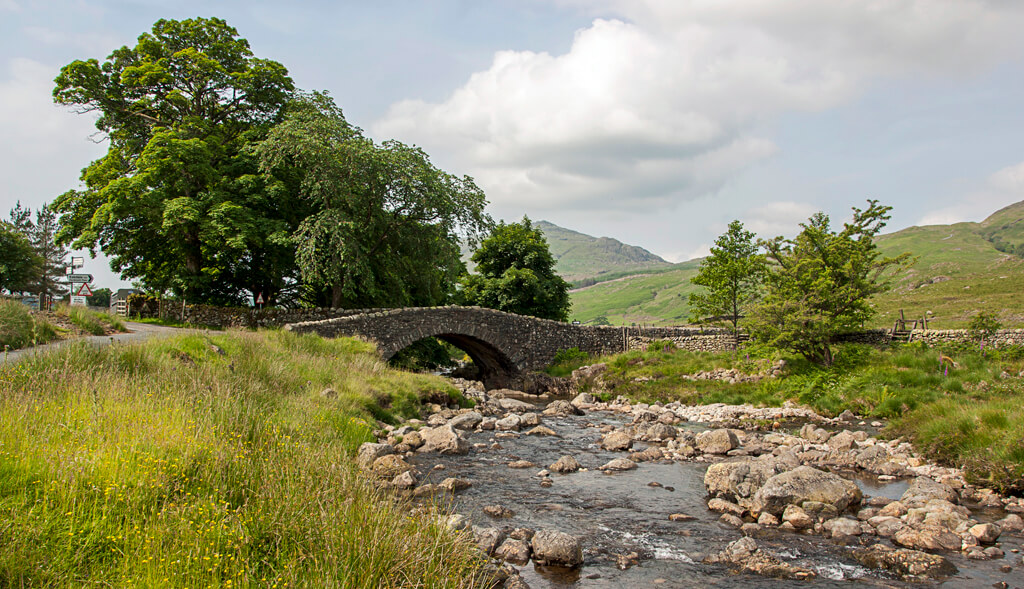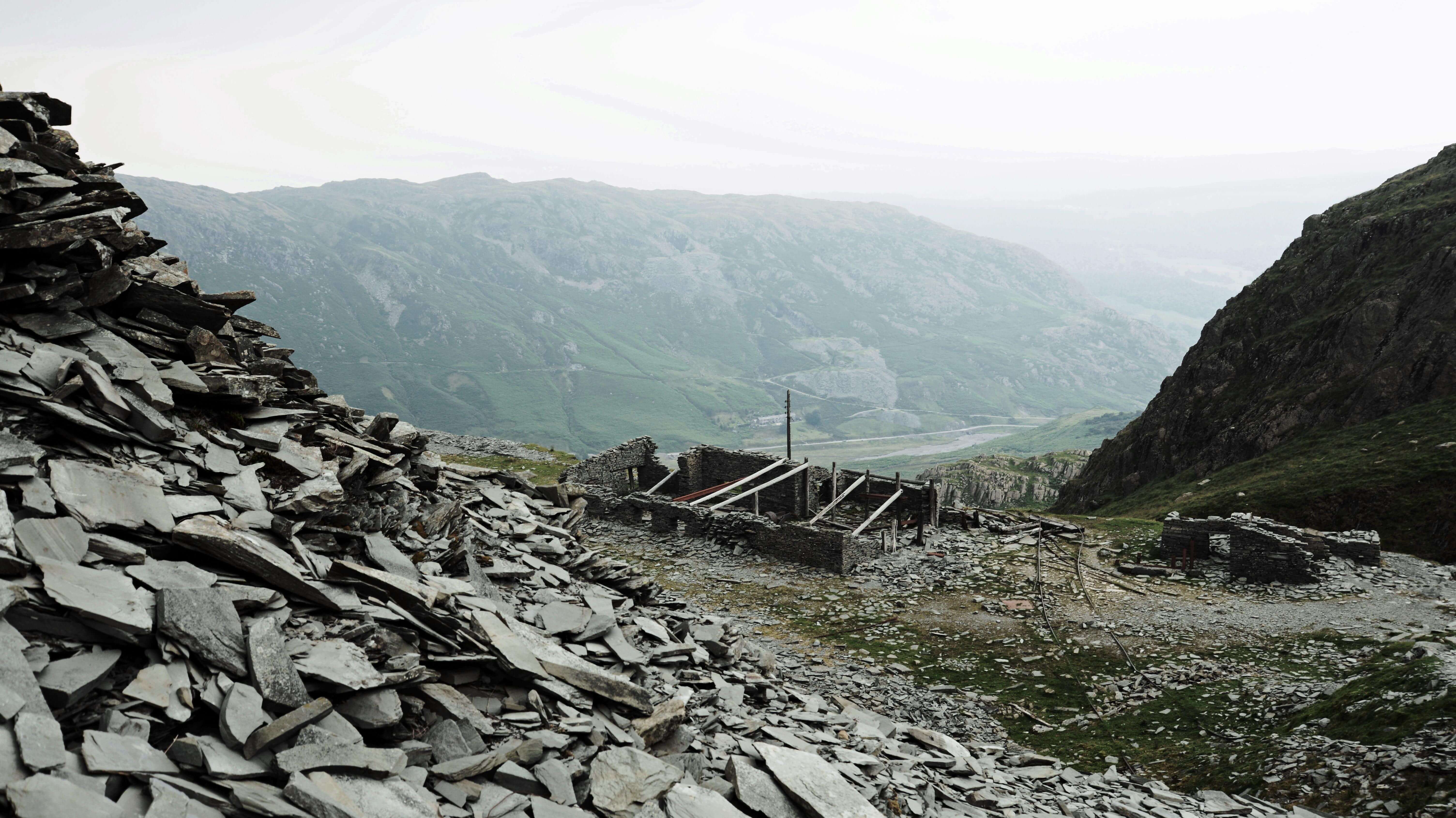
Ramblings
Saunterings
Ramblings: about North-West England
Ramblings is a set of articles about North-West England, of unknown authorship and
indeterminate date, believed to have been written for amusement on rainy days,
which are not unknown in North-West England.
41. Misadventures on the Fells: Coniston Old Man
... Black Hall ...
 We set out promptly, crossed Cockley Beck Bridge, and headed
straight up the slopes of Grey Friar. That’s the way to tackle
Grey Friar - immediately, to get it over with. Grey Friar is
one of those hills that lacks distinction. The slopes are dull.
There is little of interest on the top. And it is not on the way
anywhere (unless you are tackling it from an odd direction, like
us).
We set out promptly, crossed Cockley Beck Bridge, and headed
straight up the slopes of Grey Friar. That’s the way to tackle
Grey Friar - immediately, to get it over with. Grey Friar is
one of those hills that lacks distinction. The slopes are dull.
There is little of interest on the top. And it is not on the way
anywhere (unless you are tackling it from an odd direction, like
us).
So we were surprised to find, when we reached the top,
that a couple were already there, sipping champagne in some
sort of celebration. I couldn’t imagine why anyone would
celebrate reaching the top of Grey Friar, but Harry soon
found out why. It seemed that the man had just completed a
challenge to reach the top of the 60 highest peaks of the Lake
District in the 60 days before his 60th birthday.
How ridiculous! Why do people set themselves these
challenges? Can they not appreciate fell-walking for its
intrinsic merits, taking the rough with the smooth, accepting
rainy days as well as sunny days, without feeling the need to
tick off mountains on some arbitrary list? At least I could understand why
Grey Friar was the last of his 60 peaks.
I let my men join the celebration for a while as I surveyed
the scene. The only thing to say in Grey Friar’s favour is that
it provides a fine view, especially towards the Scafell region.
I then turned my gaze 180 degrees towards our main
objective for the day, the Old Man of Coniston. It looked easy
walking, so we set off in good spirits.
... Old Man of Coniston ...
First I took the men on a slight detour to the cairn on
Swirl How, in order that they may appreciate the view into
Greenburn. We then strode south, over the gentle rise of Brim
Fell, and on to the Old Man.
The name alone ensures that the Old Man is many people’s
favourite fell, almost a member of the family. For many fell-walkers it
is recalled fondly as the first Lake District hill they
walked up, for it is a favourite expedition for tourists staying in
the village of Coniston. The large platform on the top is usually
awash with walkers, some of whom no doubt are there taking
pride in that first conquest. I wandered apart to look at High Street, Fairfield, Helvellyn, Blencathra,
Skiddaw, Scafell Pike and, yes, even Grey Friar.
 However, as I looked south, over Coniston Water, I could
see clouds approaching. I moved the men on, towards the path
to Low Water. We were soon in amongst the dereliction of the
abandoned quarries.
The other three were intrigued by the huge piles of slates,
the rusty old machinery, and the various fenced-off shafts.
They even found a shaft that was not fenced off and asked me
for permission to have a look inside. We were well ahead of
schedule, so I let
them wander in.
However, as I looked south, over Coniston Water, I could
see clouds approaching. I moved the men on, towards the path
to Low Water. We were soon in amongst the dereliction of the
abandoned quarries.
The other three were intrigued by the huge piles of slates,
the rusty old machinery, and the various fenced-off shafts.
They even found a shaft that was not fenced off and asked me
for permission to have a look inside. We were well ahead of
schedule, so I let
them wander in.
I settled myself nearby to wait for them. I surveyed the
desolation around me. The clouds were now closing in, to help
augment this scene of utter bleakness. It is ironic that perhaps
the most popular Lake District walk should pass this region so
unlike our image of idyllic Lakeland. But, of course, there are
old mines, quarries and other industries on many Lake District
hills. Most have been so long abandoned that they have almost
merged back into the hills. But not here on the Old Man.
As I sat there, my mind wandered to think of the many
men, perhaps up to a thousand on the Coniston hills, who had
such a hard life mining these tough hills. Perhaps my three
colleagues were getting a stronger impression of this hard life.
Where were they? Fifteen minutes had passed.
I returned to my reveries. I wondered what they mined
here. The Coppermines ex-Youth Hostel gives us a clue.
Perhaps there was more than copper. The different colours of
the tarns suggests many different minerals.
Where were they? Another ten minutes. I was getting
cold: a drizzle was settling in. I peered into the shaft. I could
see a tunnel at the end of the light. Beyond that, nothing. I
could hear nothing either.
I shouted in. An echo, but no response. This was most
unreasonable. They couldn’t expect me to just sit and wait. So
I shouted in that I’d set off for Coniston. I’d dawdle along, so
that they could catch me up. They couldn’t possibly get lost
on a path as clear this.
... Coniston ...
 I reached our hotel in Coniston and signed in.
“Will your friends be joining you?” asked the man.
I reached our hotel in Coniston and signed in.
“Will your friends be joining you?” asked the man.
“They’ll be along in a minute” I said.
I went up to my room and had a leisurely shower. I then
wandered down to the bar.
“Will your friends be joining you?” asked the man.
“They’ll be along in a minute” I said.
I was quite enjoying the solitude. I
had learned to tolerate my men's strange ways, despite the many
difficulties they had caused me. Now I had the opportunity to
relax and reflect.
I strolled into the restaurant and sat down at a table set
for the four of us.
“Will your friends be joining you?” asked the man.
“They’ll be along in a minute” I said.
I partook of a rather challenging mulligatawny. And
then a Westmorland sausage (I do like to flout convention
sometimes). Followed, as always, by sticky toffee pudding,
which is said to have been ‘invented’ at Sharrow Bay in the
Lake District in the 1970s.
Afterwards I retreated to the bar. Where were they?
It was not like them to be late for their
evening meal. I thought that I had better check with the man
at reception. No, they had not signed in. He asked when I had
last seen them and I explained about the mines on the Old Man
- at which point he became rather concerned. “You’d better
ring Mountain Rescue” he said, passing me the number and a
phone.
It all seemed a bit melodramatic to me but I did as he
suggested. I told them exactly where the men had gone and
without so much as a ‘thank you’ they said “We’re on our way”.
I didn’t even have time to offer to help them but I don’t think
I intended to anyway. I’m sure Mountain Rescue know what
they’re doing. So, confident that I had done everything that
I possibly could to help, I went to bed, where I had my most
contented sleep for some time.
...
I came down to breakfast with quite an appetite. And there
they all were. I had forgotten about them. They stood as one,
to shake my hand and thank me profusely for saving them
from disaster in the Coniston mine. “It was nothing” I insisted.
But, no, they were adamant. They were most impressed
by my wisdom in not entering the shaft myself to find them.
That way, they said, all four of us might have been lost forever.
“Yes, of course” I said.
It seemed that they had walked into the shaft using a
torch that Richard had with him. But when they were far
inside Harry had dropped the torch into a deep pool. The
mine became pitch black. They had kept together, struggling
along trying to find a way back, but had become more and
more lost. Eventually, they had decided to sit tight to save
energy, knowing that their leader outside would know exactly
what to do in this emergency. “Quite right” I said. It was
very sensible, they said, to call the expert Mountain Rescue
team. “Yes indeed” I agreed.
Photos:
Cockley Beck Bridge.
An old Coniston mine.
Sticky toffee pudding.
Comments:
• Several lessons for us all there!
Ramblings
Saunterings
© John Self, Drakkar Press, 2024-

Top photo: Rainbow over Kisdon in Swaledale;
Bottom photo: Ullswater


 We set out promptly, crossed Cockley Beck Bridge, and headed
straight up the slopes of Grey Friar. That’s the way to tackle
Grey Friar - immediately, to get it over with. Grey Friar is
one of those hills that lacks distinction. The slopes are dull.
There is little of interest on the top. And it is not on the way
anywhere (unless you are tackling it from an odd direction, like
us).
We set out promptly, crossed Cockley Beck Bridge, and headed
straight up the slopes of Grey Friar. That’s the way to tackle
Grey Friar - immediately, to get it over with. Grey Friar is
one of those hills that lacks distinction. The slopes are dull.
There is little of interest on the top. And it is not on the way
anywhere (unless you are tackling it from an odd direction, like
us).
 However, as I looked south, over Coniston Water, I could
see clouds approaching. I moved the men on, towards the path
to Low Water. We were soon in amongst the dereliction of the
abandoned quarries.
The other three were intrigued by the huge piles of slates,
the rusty old machinery, and the various fenced-off shafts.
They even found a shaft that was not fenced off and asked me
for permission to have a look inside. We were well ahead of
schedule, so I let
them wander in.
However, as I looked south, over Coniston Water, I could
see clouds approaching. I moved the men on, towards the path
to Low Water. We were soon in amongst the dereliction of the
abandoned quarries.
The other three were intrigued by the huge piles of slates,
the rusty old machinery, and the various fenced-off shafts.
They even found a shaft that was not fenced off and asked me
for permission to have a look inside. We were well ahead of
schedule, so I let
them wander in.
 I reached our hotel in Coniston and signed in.
“Will your friends be joining you?” asked the man.
I reached our hotel in Coniston and signed in.
“Will your friends be joining you?” asked the man.
